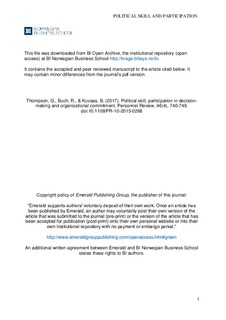| dc.contributor.author | Thompson, Geir | |
| dc.contributor.author | Buch, Robert | |
| dc.contributor.author | Kuvaas, Bård | |
| dc.date.accessioned | 2018-01-11T13:17:20Z | |
| dc.date.available | 2018-01-11T13:17:20Z | |
| dc.date.created | 2016-06-07T20:54:51Z | |
| dc.date.issued | 2017 | |
| dc.identifier.citation | Personnel review. 2017, 46 (4), 740-749. | nb_NO |
| dc.identifier.issn | 0048-3486 | |
| dc.identifier.uri | http://hdl.handle.net/11250/2477024 | |
| dc.description.abstract | Purpose Research has demonstrated that political skill is associated with leadership effectiveness. However, the field still lacks understanding of how political skill makes leaders more effective. The purpose of this paper is to contribute to the political skill literature by investigating a specific mechanism through which political skill may relate to follower commitment. Design/methodology/approach The study population was drawn from 148 supervisors and 988 subordinates from top, middle and operational levels in the business organizations. Findings Structural equation model analysis showed that political skill was positively related to Participation in decision making (PDM) and PDM was positively related to organizational commitment (OC). Furthermore, political skill indirectly predicted OC via PDM. In addition, the direct relationship between political skill and OC was not significant, suggesting “full” mediation. Finally, politically skilled leaders’ desire to encourage followers to participate in decision making was amplified by their ability to build strong, beneficial alliances and coalitions, resulting in increased social capital and even greater influence. Practical implications Involving subordinates in decision processes is likely to inspire trust and confidence, promote credibility, help develop a favorable relationship with the leader and enhance pride of participation in the organization. Originality/value The findings in the present study are of great importance for future research on political skill. It may change the approach for testing the validity of the theory by focusing on influence tactics. This approach will, in the authors’ view, constitute the future research avenue for research on political skill. | nb_NO |
| dc.language.iso | eng | nb_NO |
| dc.publisher | Emerald | nb_NO |
| dc.title | Political skill, participation in decision-making and organizational commitment | nb_NO |
| dc.type | Journal article | nb_NO |
| dc.type | Peer reviewed | nb_NO |
| dc.description.version | acceptedVersion | nb_NO |
| dc.rights.holder | Copyright policy of Emerald Publishing Group, the publisher of this journal: “Emerald supports authors' voluntary deposit of their own work. Once an article has been published by Emerald, an author may voluntarily post their own version of the article that was submitted to the journal (pre-print) or the version of the article that has been accepted for publication (post-print) onto their own personal website or into their own institutional repository with no payment or embargo period.“ | nb_NO |
| dc.source.pagenumber | 740-749 | nb_NO |
| dc.source.volume | 46 | nb_NO |
| dc.source.journal | Personnel review | nb_NO |
| dc.source.issue | 4 | nb_NO |
| dc.identifier.doi | 10.1108/PR-10-2015-0268 | |
| dc.identifier.cristin | 1360149 | |
| dc.description.localcode | 1, forfatterversjon | nb_NO |
| cristin.unitcode | 158,4,0,0 | |
| cristin.unitname | Institutt for ledelse og organisasjon | |
| cristin.ispublished | true | |
| cristin.fulltext | postprint | |
| cristin.qualitycode | 1 | |
